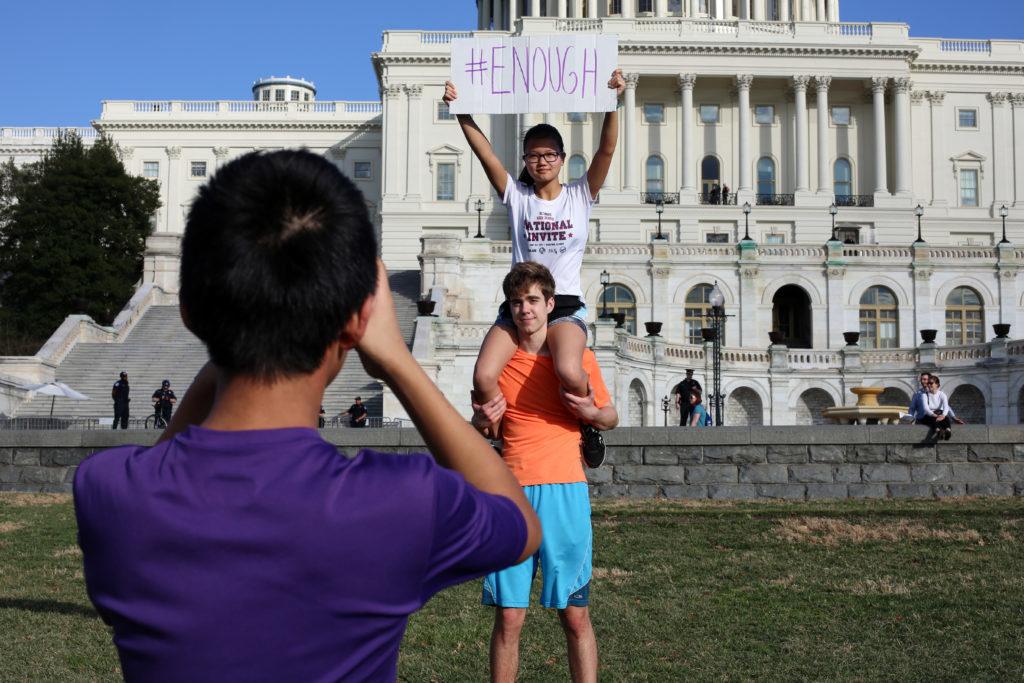As high school students mobilized to demand stricter gun control in the wake of a deadly mass shooting in a Parkland, Fla. high school last month, prospective students turned to universities with concerns that their political activism could jeopardize their chances of being accepted.
But GW told them not to worry.
Costas Solomou, the head of GW’s admissions office, released a statement last month assuring students that they will not be penalized in the University’s admissions process if they are punished for participating in peaceful protests. Admissions experts said political activism could actually be a positive for students trying to land a coveted spot in top universities because schools seek out leaders who show that they stand up for their beliefs.
“We’re not specifically looking for activists, but we’re looking for students who want to share their views.”
Solomou said officials decided to release the statement because GW wanted to “reaffirm that we support the passion that prospective students have for engaging in peaceful political and social advocacy.” The University would only consider denying a student for disciplinary action in high school if the student represents a possible threat or has displayed “consistent poor judgment” – like if they were caught cheating in classes, he said.
“We believe that their desire to peacefully advocate should not be held against them,” he said in an email.
He said a student’s out-of-class activities, including activism, are an important part of how the office decides whether to accept a student, along with other factors including GPA, teacher recommendations and their college essay.
Solomou said officials had heard from several students after the shooting that they were concerned their admissions status could be affected by participating in peaceful protests, which have been taking place at high schools across the country in recent weeks to push for stricter laws. He said the office heard positive feedback from prospective students after the statement was released.
Universities rushed to address prospective student concerns in response to viral threats from a Texas school district superintendent, who called for a three-day suspension of any student who missed school or caused disruptions to protest gun violence, the Houston Chronicle reported.
University officials across the nation – at schools like Brown, Boston, Northeastern and American universities – have issued statements to ensure that prospective students feel comfortable expressing their opinions and exercising their right to protest. High school students have taken center stage in the growing movement for gun reform, with students hosting class walkouts and D.C.-area students marching on the Capitol.
Some admissions officials conceded that students could gain from their political demonstrations by boosting the “extracurricular activities” portion of their applications, which has become an increasingly important factor for admissions officers.
Officials have increasingly looked beyond traditional metrics like high school academic performance in recent years, preferring to accept candidates based on “best fit” for the University. GW has been known to be a politically active university and held the top spot on the Princeton Review’s list of politically active schools for four years before dropping to 10th place in August.
Kirk Brennan, the director of undergraduate admission at the University of Southern California, said there are cases in which participating in a peaceful protest could benefit a student’s college application because taking a stand for political beliefs could be seen as a valued quality in an applicant.
“We’re not specifically looking for activists, but we’re looking for students who want to share their views,” he said.
Brennan said USC released its statement Feb. 24 – the day after GW – to encourage students to speak their minds and to show that the university considers disciplinary actions fairly.
Some universities included the trending #ParklandStudentsSpeak in their statements. But Brennan said that USC’s position on political activism in the admissions process does not signal endorsement of either side of the gun control debate, and instead speaks directly to the discussion about politics.
“I want all viewpoints in the classroom, I’m not specifically looking for a particular angle,” he said. “I need diversity – I don’t need homogeneity.”
Scott Clyde, the executive director of college enrollment at the University of Rochester, said his university wanted to show prospective students that they have the freedom to peacefully take a stance on issues of personal importance.
“Voicing your opinion and taking a stance on an issue is absolutely something we champion and is everyone’s right as an American.”
Rochester tweeted a statement Feb. 26 saying, “any student who participates in a meaningful, peaceful protest – especially those individuals who lead such efforts for change – will definitely not face any negative consequences during their application review process at the University of Rochester.”
He said students can explain any infractions on their disciplinary record on the Common Application. While Rochester will not reject anyone suspension for respectful political activism, destruction of property or engagement in violent behavior during political rallies will be considered, Clyde said.
“Voicing your opinion and taking a stance on an issue is absolutely something we champion and is everyone’s right as an American,” Clyde said. “But there’s lines that can be crossed.”
Jeff Schiffman, the director of admission at Tulane University, said there isn’t a “blanket rule” in determining which suspensions or other disciplinary consequences are overlooked, but Tulane supports students’ rights to demonstrate.
“If that’s something that they’re passionate about, if it’s something they feel that their voice is important, then we would absolutely encourage them to demonstrate in whatever cause that they’re most passionate about,” Schiffman said.





